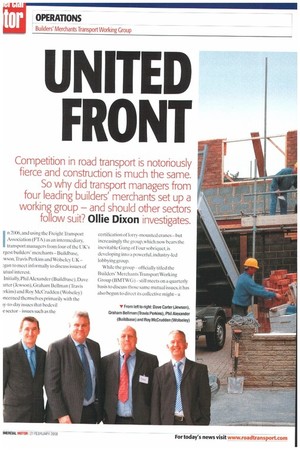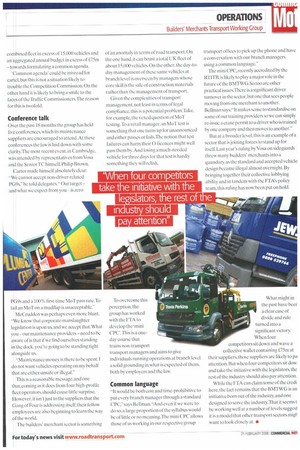UNITED FRONT
Page 48

Page 49

If you've noticed an error in this article please click here to report it so we can fix it.
Competition in road transport is notoriously
fierce and construction is much the same.
So why did transport managers from four leading builders' merchants set up a
working group — and should other sectors follow suit? 011ie Dixon investigates.
In 2006, and using the Freight Transport Association (FTA) as an intermediary, transport managers from four of the I JK 's rgest builders' merchants —Buildbase, ,wson.Travis Perkins and Wolseley UK — :gan to meet informally to discuss issues of utual interest.
Initially, Phil Alexander (Buildbase). Dave arter (Jewson),Graham Bellman (Travis .rkins) and Roy McCrudden (Wolseley) mcerned themselves primarily with the iy-to-day issues that bedevil e sector —issues such as the certification of lorry-mounted cranes—but increasingly the group, which now bears the inevitable Gang of Four sobriquet, is developing into a powerful, industry-led lobbying group.
While the group —officially titled the Builders' Merchants Transport Working Group (BMTWG )— still meets on a quarterly basis to discuss those same mutual issues. it has also begun to direct its collective might — a combined fleet in excess of 15,000 vehicles and an aggregated annual budget in excess of £75m —towards formulating a common agenda.
'Common agenda could be misread for cartel, but this is not a situation likely to trouble the Competition Commission. On the other hand it is likely to bring a smile to the faces of the Traffic Cornmissioners.The reason for this is twofold.
Conference talk Over the past 18 months the group has held fiye conferences, which its maintenance suppliers are encouraged to attend.At these conferences the law is laid down with some clarity.The most recent event, in Cambridge, was attended by representatives from Vosa and the Senior IC himself, Philip Brown.
Carter made himself absolutely clear: -.We cannot accept non-driver-related PG9s," he told delegates." Our target — and what we expect from you —is zero PCi9s and a 100% first-time MoT pass rate. To fail an MoT on a mudflap is unacceptable."
McCrudden was perhaps even more blunt. "We know that corporate manslaughter legislation is upon us, and we accept that. What you— our maintenance providers—need to be aware of is that if we find ourselves standing in the dock.you're going to be standing right alongside us.
\ I i intenance money is there to be spent.! do not want vehicles operating on my behalf that arc either unsafe or illegal."
This is a reasonable message. and one that,coming as it does from four high-profile fleet operators,should cause little surprise. I lowever, it isn't just to the suppliers that the Gang of Four is addressing itself; their fellow employees are also beginning to learn the way of the world.
ihe builders' merchant sector is something of an anomaly in terms of road transport. On the one hand, it can boast a total UK fleet of about 15,000 vehicles.On the other, the day-today management of these same vehicles at branch level is overseen by managers whose core skill is the sale of construction materials rather than the management of transport.
Given the complexities of transport management. not least in terms of legal compliance, this is a potential problem.Take, for example, the vexed question of MoT testing. To a retail manager. an Mo.I' test is something that one turns up for unannounced and either passes or fails.The notion that test failures can harm their 0-licences might well pass them by. And losing a much-needed vehicle for three days for that test is hardly something they will relish.
To overcome this perception, the group has worked with the FTA to develop the 'mini CPC'.This is a oneday course that trains non-transport transport managers and aims to give individuals running operations at branch level a solid grounding in what is expected of them, both by employers and the law.
Common language "It would be both cost and time-prohibitive to put every branch manager through a standard CPC," says Bellman."And even if we were to do so, a large proportion of the syllabus would he of little or no meaning.The mini CPC allows those of us working in our respective group transport offices to pick up the phone and have a conversation with our branch managers using a common language."
The mini CPC, recently accredited by the RTITB, is likely to play a major role in the future of the BNITWG.So too are other practical issues.There is a significant driver turnover in the sector, but one that sees people moving from one merchant to another. Bellman says:"It makes sense to standardise on some of our training providers so we can simply re-issue a crane permit to a driver who is trained by one company and then moves to another."
But at a broader level, this is an example of a sector that is joining forces to stand up for itself Last year's ruling by Vosa on sideguards threw many builders' merchants into a quandary, as the standard and accepted vehicle design became illegal almost overnight. By bringing together their collective lobbying ability and in tandem with the FTA's policy team, this ruling has now been put on hold.
What might in the past have beer a clear case of divide and rule turned into a significant victory When four competitors sit down and wave a collective wallet containing £75m at their suppliers, those suppliers are likely to pa attention. But when four competitors sit dow: and take the initiative with the legislators, the rest of the industry should also pay attention.
While the VIA can claim some of the credi here, the fact remains that the BMTWG is an initiative born out of the industry, and one designed to serve the industryThat it seems t be working well at a number of levels suggest it is a model that other transport sectors miglwant to look closely at. •












































































































































































